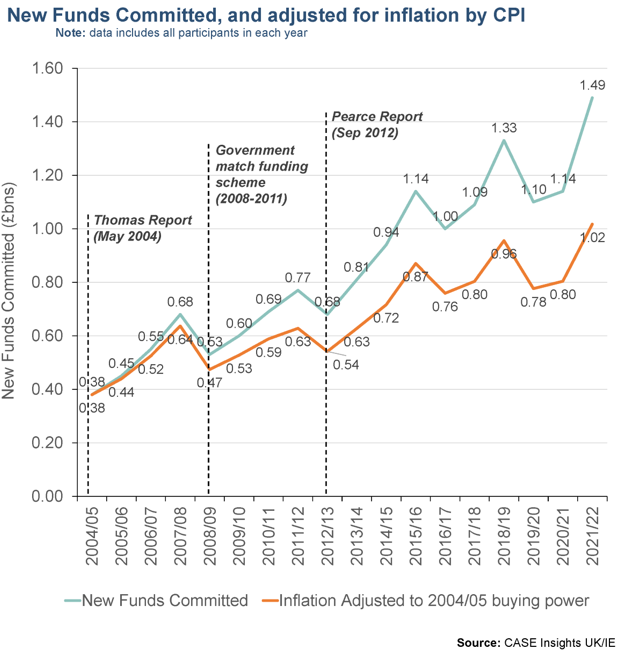CASE and More Partnership Release Joint Study of Fundraising Trends in UK Higher Education
The 10-year analysis finds that annual giving to UK universities has doubled in the decade, to a record £1.5bn in 2022—even amid increasingly challenging times for UK higher education, and with advancement staffing increasing only modestly.
The Council for Advancement and Support of Education and More Partnership have joined forces to reprise an important look at a decade of fundraising trends within the UK higher education sector. The findings and recommendations have wide-ranging implications for the sector and beyond.
The original study, The Review of Philanthropy in UK Higher Education (The Pearce Report), was published in 2012. This followed the publication of the Thomas Report in 2004 which advised universities on pursuing philanthropic support. This latest 10-year study, The CASE-More UK Philanthropy Report, draws insights from CASE’s annual survey of philanthropy efforts in UK universities, interviews with leading practitioners, influencers, and philanthropists, and survey responses from across the advancement profession to inform this important activity moving forward.
Among the most striking findings: UK universities have almost doubled the annual amount fundraised in the decade, to a record-breaking £1.5 billion in 2022. In the ten highest performing UK institutions, new funds committed philanthropically rose to a record average of 10.4% of overall turnover in 2022.

This remarkable progress is despite a host of challenges, including the disruption of the pandemic and subsequent shutdowns, the effects of Brexit, and only modest investments in advancement staffing, with the number of fundraising staff increasing by only 47% in the same ten-year period.
Meanwhile, public funding for UK universities is incredibly fragile, now dropping to its lowest level since the 1990s, the report finds. In 2016, for instance, 5% of universities posted an in-year deficit; in 2020, 32% did so. In addition, student fees have not risen in ten years—indeed home students are taught at a loss.
"Philanthropy is today more important than ever for UK universities,” notes Professor Dame Sally Mapstone, Principal and Vice-Chancellor, University of St Andrews and President of Universities UK. “Our institutions are powerful and effective agents of change. When they amplify and build out that capacity through strategic and sustained fundraising, they also amplify the profound and beneficial differences they can make.”
In 2012, when the Pearce Report was published, ethics in fundraising was on every Vice-Chancellor’s mind. Today, especially in the age of social media, university leaders and governing bodies are given cause to re-examine policies and procedures and to restrengthen due diligence.
“Higher education transforms lives and society—we have experienced this at the most fundamental levels through the challenges of recent years. This report indicates that the generosity of individuals, foundations and corporations has been immensely valuable in advancing the societal impact of educational institutions. Furthermore, CASE’s commitment to ensuring that educational institutions have globally-derived professional standards for philanthropic engagement enables them to conduct this important work with integrity,” says Sue Cunningham, CASE President and CEO.
This report outlines ingredients for successful fundraising that vary by institutional context (shared as playbooks), and details factors that are common to all. These include the importance of creating cultures for successful philanthropy across institutional leadership, including among academic leaders; and creating fundraising propositions that both capture the ambitions of the institution and are expressed as compelling invitations for investment in institutional success.
“After a generation of effort and expertise, philanthropy to UK Higher Education is coming of age,” said Nik Miller, Partner at More Partnership and the study’s co-author. “The impact of philanthropy in UK HE is extraordinary and its practice increasingly sophisticated, but public awareness remains worryingly low. The habit of giving to universities and what donors enable is a well-kept secret that needs to be broadcast.”
Recommendations include urgent action to amplify the profile of universities as charitable causes and showcase the impact of philanthropy, as well as more formalised training and progression routes for advancement professionals and academic leaders.
Read the full report, including forecasts for the next 10 years and recommendations.
About CASE
CASE—the Council for Advancement and Support of Education—is a global, not-for-profit membership association with a vision to advance education to transform lives and society.
CASE is the home for advancement professionals, inspiring, challenging, and equipping them to act effectively and with integrity to champion the success of their institutions. CASE defines the competencies and standards for the profession of advancement, leading, and championing their dissemination and application with more than 97,000 advancement professionals at 3,100 member institutions in 80 countries.
Broad and growing communities of professionals gather under the global CASE umbrella. Currently these include alumni relations, development services, communications, fundraising, government relations, and marketing. These professionals are at all stages of their careers and may be working in universities, schools, colleges, cultural institutions, or other not-for-profits. CASE uses the intellectual capital and professional talents of a community of international volunteers to advance its work, and its membership includes many educational partners who work closely with the educational sector.
Headquartered in Washington, D.C., CASE works across all continents from its regional offices in London, Singapore, and Mexico City to achieve a seamless experience for all its stakeholders, particularly its members, volunteers, and staff.
About More Partnership
More Partnership is a consultancy with roots in Scotland and clients around the world. We believe in the power of philanthropy to advance great ambitions—and in partnering with our clients as a force to make that happen. We have been putting that belief into action since 1989.







